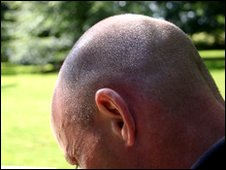Baldness 'could be good for your health' say scientists
16.03.2010 in HAIR LOSS HEALTH NEWS
Baldness is a result of high levels of the male hormone testosterone
A receding hairline can be a good thing, according to US scientists, who say men who go bald by 30 appear to be less likely to develop prostate cancer.
Researchers at the University of Washington School of Medicine studied 2,000 men aged between 40 and 47.
They were able to link high levels of the male hormone testosterone in those who lose their hair earlier with a lower risk of tumours.
The findings are published in the journal Cancer Epidemiology.
Half of the men in this study had suffered prostate cancer.
Researchers compared the rate of tumours in those who said their hair had thinned by the age of 30 with those who did not suffer hair loss.
Men who had started to develop bald spots on the top of their heads as well as receding hairlines had a 29% to 45% reduction in the risk of prostate cancer.
Roots of baldness
By age 30, approximately 25-30% of men will have some baldness, researchers believe. Half of all men suffer significant hair loss by the age of 50.
Baldness is caused when hair follicles become exposed to too much dihydrotestosterone (DHT). This is a chemical produced by the male hormone testosterone.
Experts believe that men with high levels of testosterone are more likely to lose their hair, especially if baldness runs in the family.
Prostate cancer sufferers are often given drugs to reduce testosterone levels because they can accelerate the growth of some tumours once they develop.
But this study suggests that high levels of testosterone from a young age might protect against the disease.
Dr Helen Rippon, head of research management at The Prostate Cancer Charity, says: “Clearly, the age at which a man begins to lose his hair is unfortunately not a risk factor for prostate cancer over which he has any control.
“However, if these results are correct, they could be useful in providing us with a greater understanding of how testosterone behaves in the body and how it can affect different tissues.”
Dr Alison Ross of Cancer Research UK said the link between baldness and prostate cancer is still unknown because previous studies have found the opposite to this one.
“The results hinge on asking men between ages 40 and 70 to remember whether their hair was thinning when they were 30, which does not provide a very reliable measurement,” she added.
Do you have Hair Loss Problems, read our Hair Loss Help









